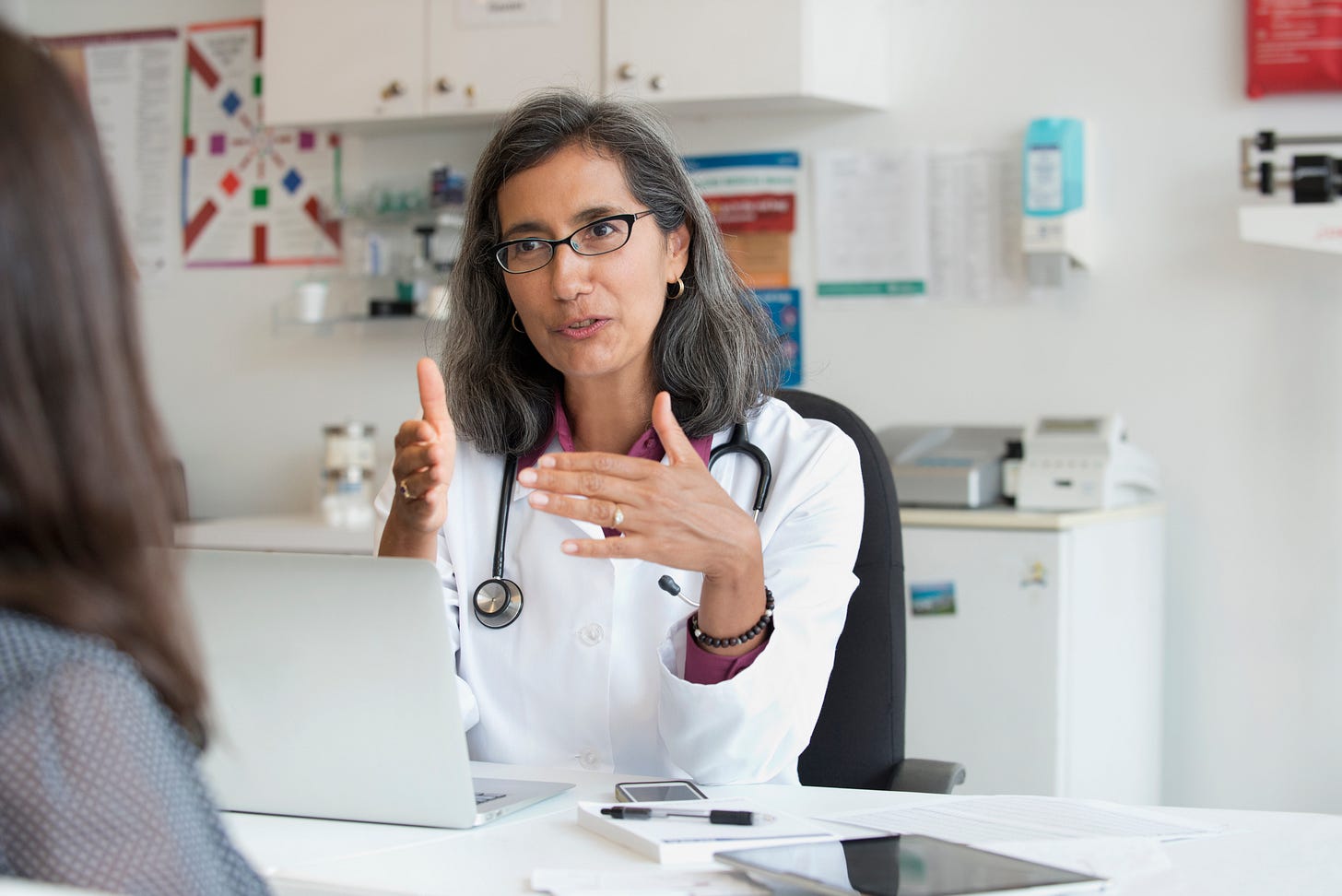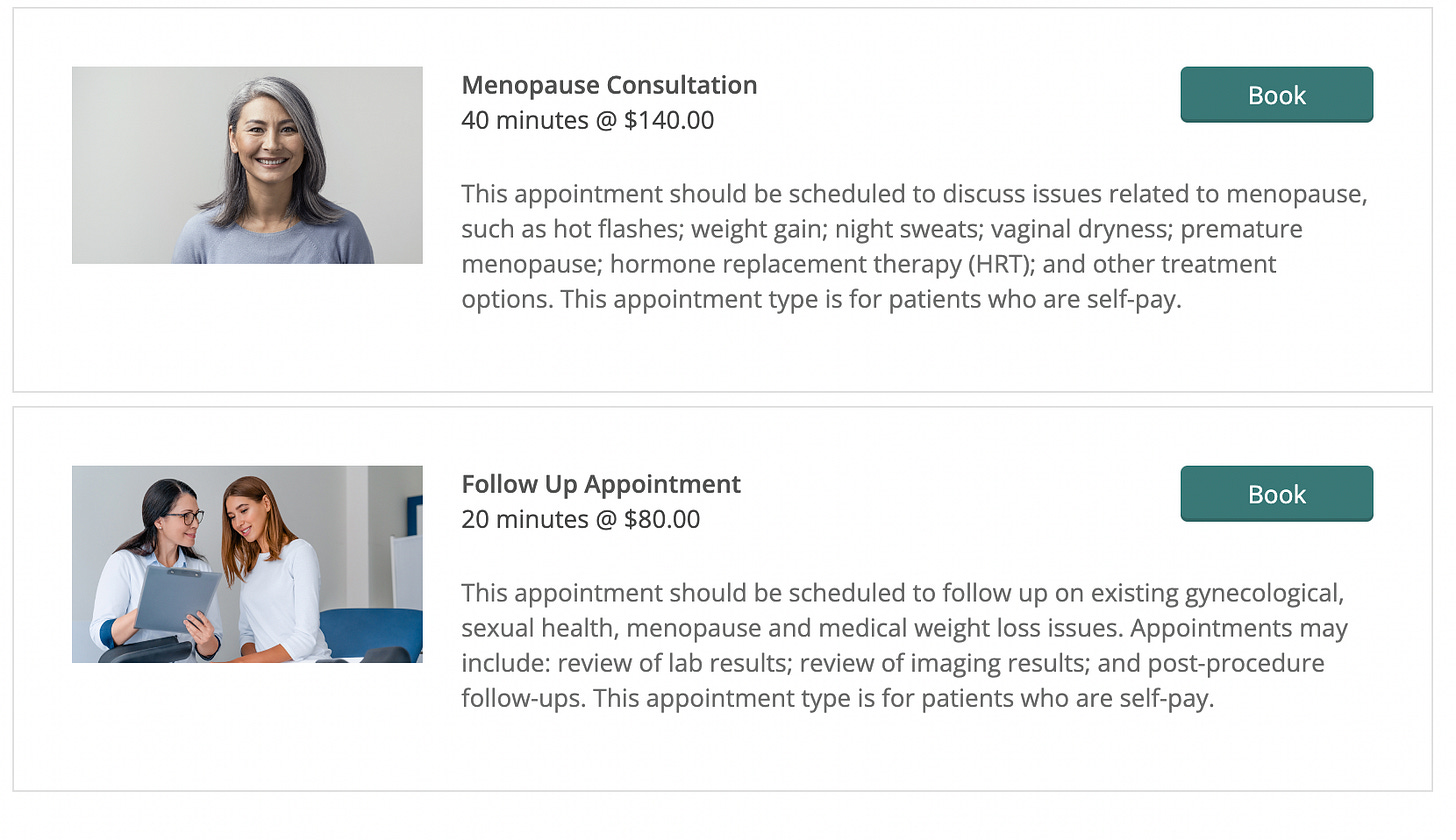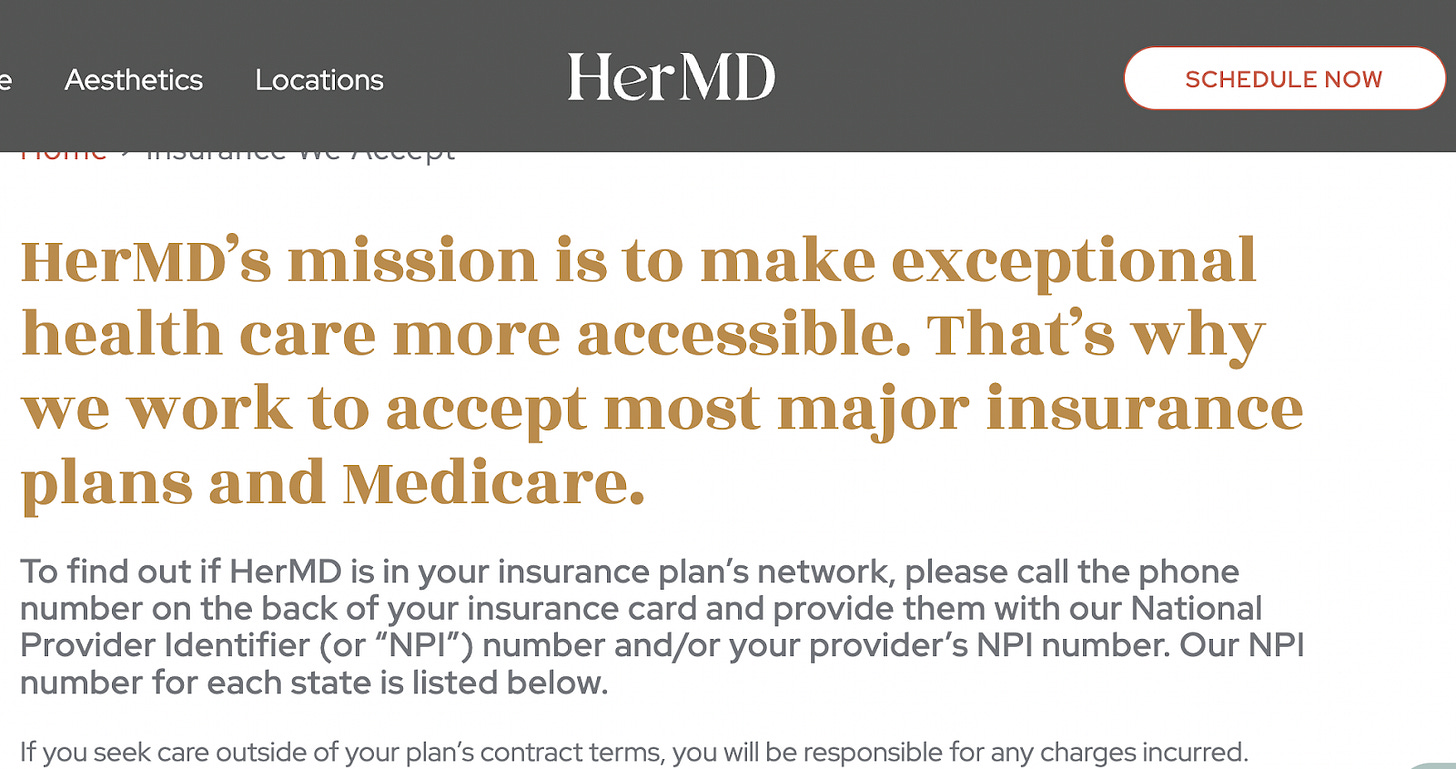“Hello! Love your page! I just had a complimentary consult with a physician from HerMD that said they would not prescribe oral estrogen due to liver and heart disease effects and would only prescribe the patch or the lotion. They also required frequently lab monitoring of hormone levels. I said no thanks! This is not helping women! What are your thoughts?”
Via Instagram
Short Take:
While transdermal estrogen is generally considered the first line for menopausal hormone therapy, oral estrogen is acceptable for an otherwise healthy person. Frequent lab monitoring of hormone levels is not recommended. In fact, hormone level testing to manage menopausal hormone therapy is on my “You are being meno-scammed” list.
Tell Me More:
According to their website, HerMD is a medical practice that offers both in person and virtual gynecological care and aesthetics in several states. Menopause is advertised on their website as part of their expertise.
I don’t know if this consultation with HerMD happened in person or virtually, but a lot of menopause care can be done remotely by telephone, video or even by email. I often do telemedicine with my patients to discuss the menopause transition and to review treatment options. I may even order lab work or tests, like an ultrasound, based on the consultation. And of course, some discussions may lead to needing an exam in the office, for example, abnormal bleeding concerns or vaginal discomfort or not responding to vaginal estrogen.
That being said, if someone is otherwise healthy, has no bleeding concerns or history that is concerning for endometrial precancer or cancer, has a documented recent normal blood pressure, lipid panel, screening test for diabetes, and mammogram, and has an ASCVD score of less than 10% (it’s a tool that predicts the risk of heart attack and stroke, read more about that here), then I have prescribed menopausal hormone therapy without seeing someone in person. I have also prescribed gabapentin and venlafaxine for hot flashes without an in person exam. I’ve never ordered hormone levels in this scenario, because that isn’t standard of care.
Let’s address the oral estrogen issue first. The general belief is that transdermal pharmaceutical estradiol (patch, vaginal ring, spray, lotion, or cream) is the preferred therapy. With this delivery method, estrogen enters the bloodstream directly across the skin or the vaginal mucosa (lining), whereas with oral medication, it goes through the bowel and to the liver before entering the bloodstream, something known as the first pass effect. The risk of blood clots and stroke with transdermal therapy appears to be lower than oral, but admittedly we don’t have good data comparing the two head to head. In general, transdermal therapy is considered the starting therapy of choice. However, oral therapy is an acceptable route. This is what The National Menopause Society 2022 Guidelines say about the matter (we’ll use these guidelines as HerMD is a US based company):
Nonoral routes of administration (eg, transdermal, vaginal) may offer potential advantages because nonoral routes bypass the first-pass hepatic effect; however, it is unknown whether nonoral routes of ET or EPT are associated with lower risk (vs. oral routes) of VTE, breast cancer, and cardiovascular (CV) events because clinical trials have not been designed to examine those outcomes.
And
Observational studies have not demonstrated an increased risk of venous thromboembolism with transdermal estrogen therapy, and limited observational data suggest less risk with transdermal versus oral estrogen therapy, but comparative randomized clinical trial data again are lacking.
The 2022 NAMS guidelines clearly states that oral therapy is acceptable.
There are situations where I would be firmer about steering away from oral estrogen. For example, an ASCVD score of 5-9% or gallbladder disease. Also, if I had a patient with a history of menstrual migraines I’d recommend transdermal therapy as the levels have fewer ups and downs.
But transdermal doesn’t work for everyone for a variety of reasons, so that is why it’s good to also have oral options.
I wondered if perhaps the information from HerMD was lost in translation. After all, for many people the first pass effect may be a new phrase, and so I contacted HerMD with some questions. Instead of setting up an interview, they offered me a complementary appointment with a provider. So I had the appointment, and I was clear that I was asking questions for an article and wasn’t interested in a consultation. The physician I spoke with hadn’t been told my appointment was actually an interview. He told me that regarding hormone therapy they followed the NAMS guidelines and recommended transdermal, but for an appropriate patient they would prescribe oral estrogen.
So I don’t know if the reader received different information than I did or if there was a communication issue.
On to the hormone levels. No medical professional society recommends hormone levels to monitor menopausal hormone therapy. We know the dose that protects the bones against osteoporosis and we treat symptoms based on, well, having symptoms that estrogen can treat, so hot flashes or night sweats. Some non approved reasons that might be acceptable to consider a trial of estrogen therapy include mild depression in the menopause transition, worsening of migraines, joint pain, or loss of libido (not an exhaustive list). None of this requires hormone levels, although testing to rule out other conditions may well be indicated. We start estrogen (typically a 25 mcg or 50 mcg patch or equivalent) and then wait two months and see how it’s helping and make adjustments at that point if needed based on the response.
Levels don’t predict symptoms and furthermore, they aren’t as accurate as people might think. For example, a 25 mcg estradiol patch, which is a standard starting dose, produces estradiol levels that average to 25 pmol/liter (for reference, the average daily estradiol level before menopause is 100 pmol/liter). However, if someone were using a 25 mcg patch and their estrogen level were 19 we wouldn’t say the person wasn’t on enough estrogen, because the test doesn’t perform well enough to distinguish 25 from 19 and, as already mentioned, levels don’t predict effectiveness.
The issue here isn’t just wasted money. Many people are told incorrectly they need estrogen levels of 50 or higher. And so if the levels are lower, they might have their dose increased when they don’t need it. In addition, if testosterone levels are ordered when not indicated and they are low, that could lead someone to think they need testosterone therapy, but testosterone also isn’t recommended based on levels.
I asked the physician from HerMD about their policy for checking estrogen levels. I was told it was standard to measure hormone levels before starting menopausal hormone therapy and for regular intervals thereafter until the levels are stabilized. This is not standard of care.
The cost of an initial 40 minute virtual self-pay consultation with a HerMD physician is $140, which is reasonable. However, follow-up 20 minute visits are $80, and if you need those visits to review lab work, that’s going to add up. And then of course there is the price of the blood work and that may not be covered by insurance if it isn’t standard of care. I believe doctors should get paid for reviewing complicated labs, but hormone levels for menopausal hormone therapy aren't complicated because they are not necessary.
I did a little digging and it looks like HerMD raised $10 million in venture capital (VC) money. Starting a medical practice is expensive, so many doctors need loans or other seed money to set up shop. HerMD has several physical offices and also offers a lot of different cosmetic procedures, and setting up physical office space and renting or buying equipment isn’t cheap. According to this article they have plans to “to open 10 physical centers over the next 18 months.” So that’s a lot of rent, staff, and equipment.
Why go to a VC for money over taking a bank loan? Loans to start practices are typically a lot less than $10 million and payments with interest start immediately, so you need cash flow immediately. Also, opening multiple offices is likely too risky for a bank. With VC money, they are taking an ownership stake in your company, potentially more than 50% ownership, which means they may decide how the business is run or at least have an input. However, there are no interest payments to make, instead, they make their money back once the company is acquired or goes public. If you don’t sell, or you go out of business, they lose everything as well, unlike the bank which will expect you to sell your assets and at least pay them back for some portion of the loan. VCs are accepting a lot more risk than the bank, but they also exert a lot more control and apply a lot more pressure on how you run your business.
The expert I spoke with told me that VCs investing in early stage businesses are typically looking for 10x returns on their investment which they receive when the business either goes public or sells itself to another firm, although it’s possible in healthcare they are willing to bet on ventures with less of a return. But even if they are looking at 4x or 5x the return, this means the business must achieve some level of rapid and sustainable growth that seems to be above and beyond the normal levels of profitability of a regular gynecologist’s office. Especially when the website says they take insurance.
There is nothing fundamentally wrong with VC funding, or making a profit, but I wonder how a gynecology practice can generate VC worthy returns? Certainly $140 for 40 minutes of physician time isn’t going to get you there. The only ways to increase profitability are charging more for services, doing more procedures (they pay more than talking with people), or finding some other way to make money, for example supplements or aesthetics. Looking at the website, it seems HerMD has a prominent aesthetics component, which is the real money maker.
It will be interesting to see what happens with HerMD and other similar practices down the road. There are a lot of people getting into the menopause telemedicine space. Regardless of their financing model, you don‘t need hormone levels to start menopausal hormone therapy. And if anyone says you do, I’d get another opinion.
References
Treatment of Symptoms of the Menopause: An Endocrine Society Clinical Practice Guideline. Cynthia A. Stuenkel, Susan R. Davis, Anne Gompel, Mary Ann Lumsden, M. Hassan Murad, JoAnn V. Pinkerton, Richard J. Santen. The Journal of Clinical Endocrinology & Metabolism, Volume 100, Issue 11, 1 November 2015, Pages 3975–4011
Menopausal hormone therapy: Benefits and risks. Kathryn A. Martin and Robert Barbieri. UpToDate.
Hormone Therapy for the Primary Prevention of Chronic Conditions in Postmenopausal Persons. Updated Evidence Report and Systematic Review for the US Preventive Services Task Force. Gerald Gartlehner, MD, MPH; Sheila V. Patel, PhD; Shivani Reddy, MD, MS; et al. JAMA. 2022;328(17):1747-1765.
The 2022 hormone therapy position statement of The North American Menopause Society. Menopause: The Journal of The North American Menopause Society. Vol. 29, No. 7, pp. 767-794.
Osteoporosis Prevention, Screening, and Diagnosis. Clinical Practice Guideline No. 1. American College of Obstetricians and Gynecologists. Obstet Gynecol 2021;138:494–506.








Hi Dr. Jen, long time follower on twitter/reader and just subscribed, because I've been diagnosed with POI at age 39 after years of irregular periods and now no period for 4 months, plus having symptoms like hot flashes and fatigue. I was wondering if you have any posts on POI and best practices for medication/HRT. I started oestrogel and it helped relieve the symptoms almost immediately but don't know how to determine what the best dose might be, there's so much misinformation online. In the various online communities for POI, it seems a lot of doctors are not aware of how best to treat it and women seem to struggle to get adequately treated and it would be so helpful to be able to share your knowledge with them. I will of course talk with my prescribing doctor about my questions as well. Thank you for your expertise!
Dr Gunter, do you take new patients for your practice?